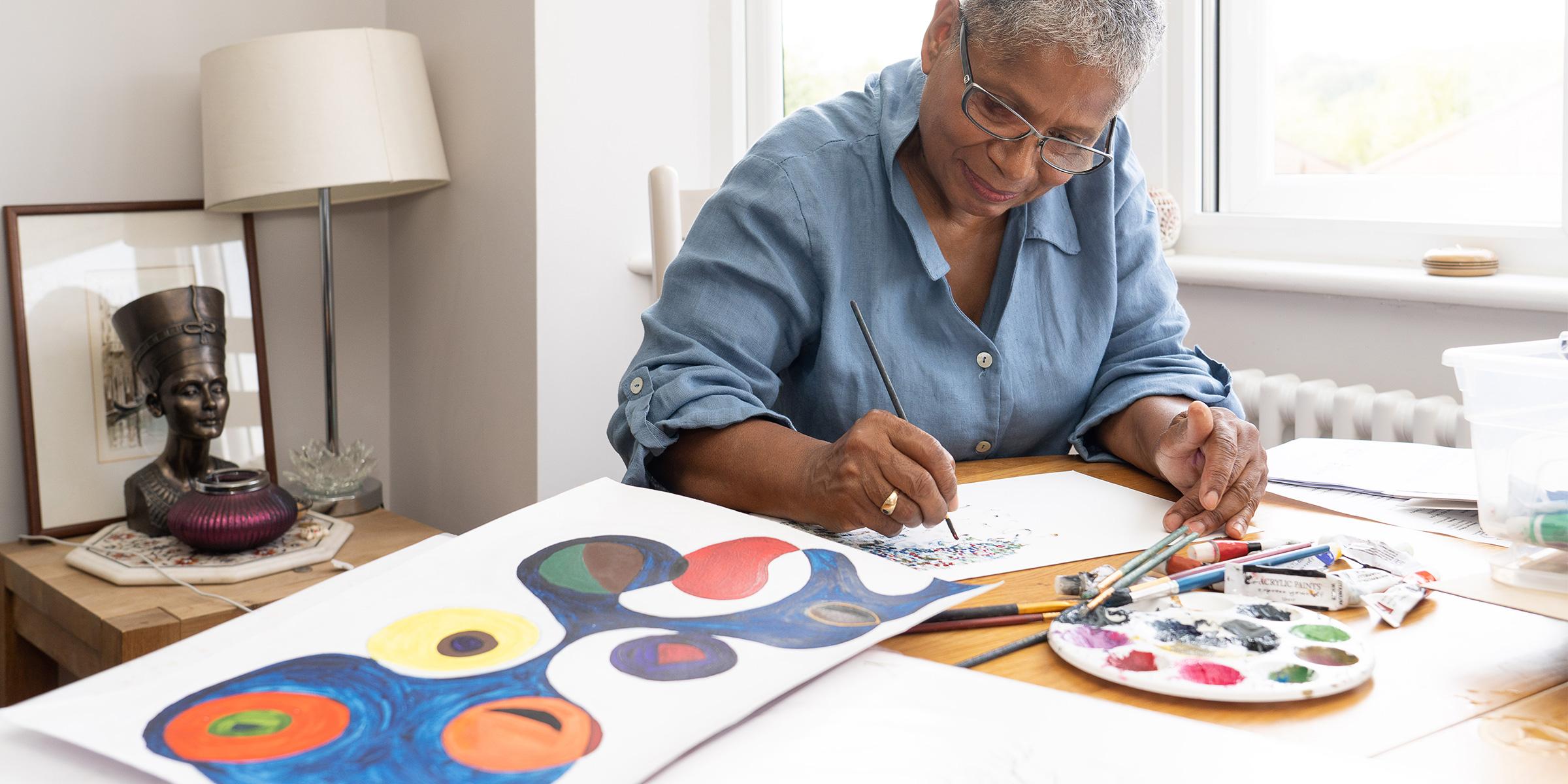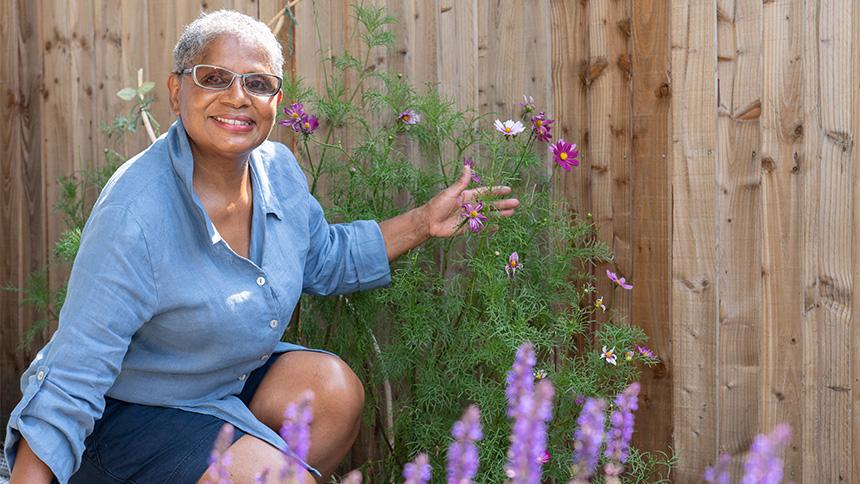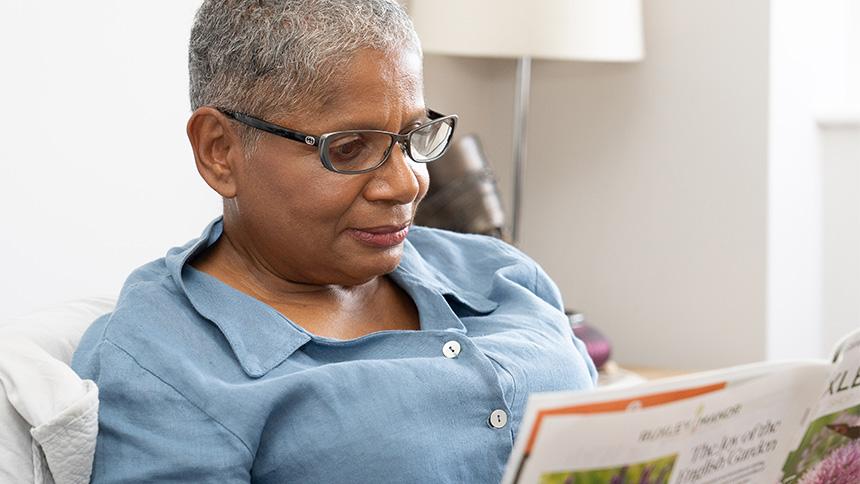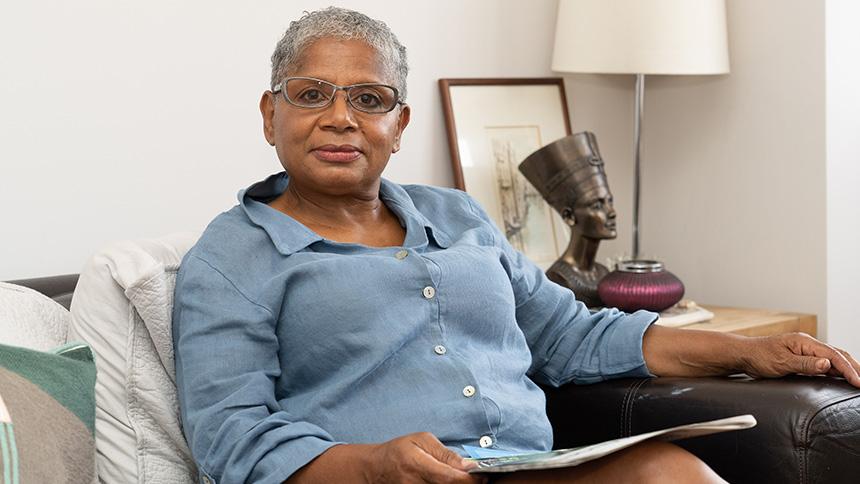
Still worthy: ‘I’m not going to let dementia define me’
The pandemic has been difficult and isolating for Vesna, but she remains determined to find happiness in who she is.
‘It’s so important to identify dementia early on and get the right support, rather than struggling,’ says Vesna, who hadn’t even heard of vascular dementia until she was diagnosed with it.
Having developed her own awareness and understanding, Vesna wants others to do the same, so they can be supported to maintain a quality of life.
‘I want people to know that they are more than a disease or diagnosis,’ she says. ‘You still have creativity and can experience new things and take on new challenges.’
Press the orange play button to hear Vesna’s story in her own words:
Difficult childhood
Having been abandoned at birth, Vesna and her twin sister Loraine were raised in the care system in Manchester. They moved home around 15 times in the first five years of their lives, being looked after by foster carers but never formally adopted by anyone.
‘I would say it was a very sad childhood – very difficult and painful,’ says 65-year old Vesna, who now lives in Bromley in south-east London. ‘We never knew our identity.’
In her early 40s Vesna found out that her mother was Scottish and that her father had come to England from Ghana, which Vesna then visited to find out more about her birth family.
‘I have relationships with my siblings on my mother’s side, but not on my father’s side since he died,’ she says.
‘I was also trying to have a relationship with my mother, but one minute she wants to know you, then she doesn’t, so I decided to withdraw.’

Working in her garden puts Vesna in a ‘peaceful place’.
Vesna and Loraine moved to Aylesbury in Buckinghamshire aged18. While Loraine became a community midwife, Vesna went into nursing before having a career as an adoption and fostering social worker.
‘Perhaps I wanted to put the wrongs right, but I don’t think it was a good idea as it brought up a lot of issues for me,’ she says.
Complete mess
Vesna started experiencing problems with her memory at work 11 or 12 years ago.
‘I’d interview someone and, as soon as I left the house, I’d forgotten the content,’ she says.
‘Computer training wasn’t sticking, it was in one ear and out the other, and I was forgetting people I was supposed to know.
‘If I had more than two or three pieces of paper going through the photocopier, I’d get in a complete mess.’
Vesna, who was also having headaches and high blood pressure, tried to hide her symptoms for some time, but later visited her doctor and was sent for a brain scan. This led to a diagnosis of vascular dementia from a consultant at a memory clinic.
‘My diagnosis didn’t really have an impact initially, because I didn’t really understand it,’ says Vesna. ‘Vascular dementia wasn’t something I was aware of – it was new to me.’
Vesna has also experienced falls, which she thinks might be linked to her dementia. She can also struggle with sleeping, which has been a problem since well before her diagnosis.
Peaceful place
The challenges of dementia continue to affect Vesna’s daily life.
‘I can lose things easily or forget what I’ve gone into a room for,’ she says. ‘I had a scam phone call which almost led me to give my bank details. I felt very vulnerable at that point. I thought, “Why didn’t I see that?”’
Vesna has introduced strategies to help herself manage better.
‘I would forget appointments, so now if I’ve got something to do or I need to remember something, I try to put alerts on my phone, to use it as a memory box,’ she says.
Vesna also tries to put herself in situations where she doesn’t need to rely so heavily on her memory.
‘I’ve been quite successful in growing vegetables in my garden,’ she says. ‘It puts me in a peaceful place where I’m enjoying it without feeling any pressure.’
She also paints and writes poetry.

Vesna has found strategies to help manage her dementia symptoms.
‘I try to keep my brain active, and I also find they help with relaxation, because you’re fully absorbed. Sometimes I even shock myself that I’m able to spend two hours doing a picture!’
Vesna got into painting at Kaleidoscope Café, a fortnightly group for people with dementia aged under 65, run by the centre Age Exchange. Since coronavirus, meetings have been taking place by video call.
‘Age Exchange have been wonderful – I really value their support,’ says Vesna, who has lost contact with people in other areas of her life following her diagnosis.
‘The staff put so much of themselves into it. They’re motivating you to explore different things and they have a genuine desire to make people’s lives better.’
Vesna was especially grateful for the café’s telephone support during the stricter stretches of the coronavirus lockdown.
‘They’re amazing – without them I’d have been at a great loss,’ she says.
Little friend
Vesna lives alone, but only about a 15-minute bus ride from her daughter, who lives with her partner and two children.
‘My independence is very important. It’s important for me to have space, and peace and quiet, with no pressure,’ she says.
Vesna likes knowing that her family are nearby if she needs them and is grateful for their support.
‘My daughter leads a busy life, but she helped me sort out moving to this flat. She sorts the shopping out and makes sure that bills are paid,’ says Vesna.
‘My eight-year old granddaughter is also very good at reminding me of things. She’s a little friend who’s very helpful.’
For part of lockdown Vesna couldn’t be around anyone, including her family.
‘Lockdown was tremendously difficult and quite isolating, and I still try not to mix with other people outside my family,’ she says. ‘But being able to see my family again has changed everything.’
Quality care
Vesna urges other people with dementia to overlook and overcome any misconceptions that they are redundant or without purpose.
‘With the support of other people, you have to make it feel like you have a worth. I still want to do as much as possible,’ says Vesna, who visited Australia to meet some of the people who looked after her as a child.
Vesna has spoken about her experiences of dementia at conferences and events, including addressing a group of occupational therapists about dementia care.
Vesna’s twin sister died of cancer around six years ago, and Vesna was impressed by the holistic approach taken to her care, which didn’t just focus on the medical side.
‘In her hospice, she had art therapy and counselling. I thought it was a wonderful way of her getting support,’ she says. ‘I see parallels with the care of people with dementia.’
More than memory
Vesna’s positive outlook has helped her to accept changes in herself.
‘You can find happiness in how you are. That doesn’t rely on memory – you’re more than your memory,’ she says.
‘I thought The Restaurant That Makes Mistakes programme encapsulated how you can have people with memory issues but draw on other strengths they have.’

‘You’re more than your memory,’ says Vesna.
Vesna hopes that her story will help improve people’s awareness of dementia.
‘I didn’t know anything about dementia and I don’t know if my employers were particularly aware of it,’ she says. ‘If I’d have known more, I think I would’ve sought help earlier.’
And as she looks ahead, Vesna hopes that others with dementia won’t shut themselves away or let their diagnosis rule their life completely.
‘Dementia is not a death sentence for me. I know there’ll come a time when I will probably deteriorate, but until then I want to feel that I’m having a good quality of life, new experiences and developing friendships with like-minded people,’ she says.
‘While I have breath, I’m not going to let dementia define me.’
We need your help
Your support helps us to campaign for timely diagnosis, so people like Vesna aren’t left to struggle.




Eva
saysMy husband had a stroke 6weeks ago he had weak arm on his right. Still in hospital he got delirium He's sleeping a lot takes his medication back to sleep. Hes immobile hes 81years old past weeks he lost a lot of weight because hes not eating but hes drinking nurses told me.
Im very worried sick hes deteriorating fast. I havent got a clue if he got dementia or alzheimers pls advice me what to do.
Hes on lorazepam due to agitation, confused and delirium.
Alzheimer's Society
saysHi Eva, I'm very sorry to hear about your husband. We would advise that first you discuss your concerns about dementia with the doctors at the hospital.
You can also talk to one of our dementia advisers on 0333 150 3456 for information, advice and support: https://www.alzheimers.org.uk/dementia-connect-support-line
I really hope you are able to get the support you need in this difficult time
Alzheimer's Society blog team
John
saysA very warm story and touching it really reminded me of my past and my life today. Thank you vansa.
Martin Corrick
saysI totally agree with you, Vesna, we have to try to keep active and not let our disease get us down! Thanks for your supportive message! Martin
MELANIE RANDALL
saysVesna has achieved so much despite all the obstacles against her , including her diagnosis of Vascular dementia.
Truly an admirable and courageous woman.
Well done to you Vesna, all the best for the future.
Sandra Welby
saysVesna is amazing Lady, she's not going to let this dementia take over her life.
She's loving and caring.
Great mum and grandma, and sister.
xx